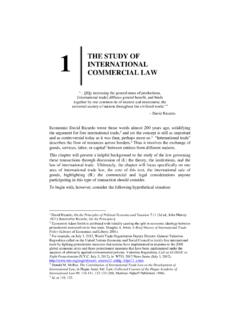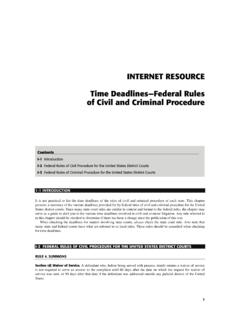Transcription of Federal Rules of Civil Procedure Rule 23
1 Federal Rules of Civil Procedure Rule 23 UNITED STATES CODE ANNOTATED Federal Rules OF Civil Procedure FOR THE UNITED STATES DISTRICTCOURTS IV. PARTIES Rule 23. Class Actions (a) Prerequisites to a Class Action. One or more members of a class may sue or be sued asrepresentative parties on behalf of all only if (1) the class is so numerous that joinder of allmembers is impracticable, (2) there are questions of law or fact common to the class, (3) theclaims or defenses of the representative parties are typical of the claims or defenses of the class,and (4) the representative parties will fairly and adequately protect the interests of the class.(b) Class Actions Maintainable. An action may be maintained as a class action if theprerequisites of subdivision (a) are satisfied, and in addition:(1) the prosecution of separate actions by or against individual members of the class would create a risk of(A) inconsistent or varying adjudications with respect to individual members of the class whichwould establish incompatible standards of conduct for the party opposing the class, or(B) adjudications with respect to individual members of the class which would as a practicalmatter be dispositive of the interests of the other members not parties to the adjudications orsubstantially impair or impede their ability to protect their interests; or(2) the party opposing the class has acted or refused to act on grounds generally applicable to theclass, thereby making appropriate final injunctive relief or corresponding declaratory relief withrespect to the class as a whole.
2 Or(3) the court finds that the questions of law or fact common to the members of the classpredominate over any questions affecting only individual members, and that a class action issuperior to other available methods for the fair and efficient adjudication of the controversy. Thematters pertinent to the findings include: (A) the interest of members of the class in individuallycontrolling the prosecution or defense of separate actions; (B) the extent and nature of anylitigation concerning the controversy already commenced by or against members of the class; (C)the desirability or undesirability of concentrating the litigation of the claims in the particularforum; (D) the difficulties likely to be encountered in the management of a class action.(c) Determining by Order Whether to Certify a Class Action; Appointing Class Counsel; Noticeand Membership in Class; Judgment; Multiple Classes and Subclasses.(1)(A) When a person sues or is sued as a representative of a class, the court must--at an earlypracticable time--determine by order whether to certify the action as a class action.
3 (B) An order certifying a class action must define the class and the class claims, issues, ordefenses, and must appoint class counsel under Rule 23(g).(C) An order under Rule 23(c)(1) may be altered or amended before final judgment.(2)(A) For any class certified under Rule 23(b)(1) or (2), the court may direct appropriate noticeto the class.(B) For any class certified under Rule 23(b)(3), the court must direct to class members the bestnotice practicable under the circumstances, including individual notice to all members who canbe identified through reasonable effort. The notice must concisely and clearly state in plain, easily understood language:. the nature of the action,. the definition of the class certified,. the class claims, issues, or defenses,. that a class member may enter an appearance through counsel if the member so desires,. that the court will exclude from the class any member who requests exclusion, stating when andhow members may elect to be excluded, and.
4 The binding effect of a class judgment on class members under Rule 23(c)(3).(3) The judgment in an action maintained as a class action under subdivision (b)(1) or (b)(2),whether or not favorable to the class, shall include and describe those whom the court finds to bemembers of the class. The judgment in an action maintained as a class action under subdivision(b)(3), whether or not favorable to the class, shall include and specify or describe those to whomthe notice provided in subdivision (c)(2) was directed, and who have not requested exclusion,and whom the court finds to be members of the class.(4) When appropriate (A) an action may be brought or maintained as a class action with respectto particular issues, or (B) a class may be divided into subclasses and each subclass treated as a class, and the provisions of this rule shall then beconstrued and applied accordingly.(d) Orders in Conduct of Actions. In the conduct of actions to which this rule applies, the courtmay make appropriate orders: (1) determining the course of proceedings or prescribing measuresto prevent undue repetition or complication in the presentation of evidence or argument; (2)requiring, for the protection of the members of the class or otherwise for the fair conduct of theaction, that notice be given in such manner as the court may direct to some or all of the membersof any step in the action, or of the proposed extent of the judgment, or of the opportunity ofmembers to signify whether they consider the representation fair and adequate, to intervene andpresent claims or defenses, or otherwise to come into the action; (3) imposing conditions on therepresentative parties or on intervenors; (4) requiring that the pleadings be amended to eliminatetherefrom allegations as to representation of absent persons, and that the action proceedaccordingly.
5 (5) dealing with similar procedural matters. The orders may be combined with anorder under Rule 16, and may be altered or amended as may be desirable from time to time.(e) Settlement, Voluntary Dismissal, or Compromise.(1)(A) The court must approve any settlement, voluntary dismissal, or compromise of the claims,issues, or defenses of a certified class.(B) The court must direct notice in a reasonable manner to all class members who would bebound by a proposed settlement, voluntary dismissal, or compromise.(C) The court may approve a settlement, voluntary dismissal, or compromise that would bindclass members only after a hearing and on finding that the settlement, voluntary dismissal, orcompromise is fair, reasonable, and adequate.(2) The parties seeking approval of a settlement, voluntary dismissal, or compromise under Rule23(e)(1) must file a statement identifying any agreement made in connection with the proposedsettlement, voluntary dismissal, or compromise.
6 (3) In an action previously certified as a class action under Rule 23(b)(3), the court may refuse toapprove a settlement unless it affords a new opportunity to request exclusion to individual classmembers who had an earlier opportunity to request exclusion but did not do so.(4)(A) Any class member may object to a proposed settlement, voluntary dismissal, or compromise that requires court approval under Rule 23(e)(1)(A).(B) An objection made under Rule 23(e)(4)(A) may be withdrawn only with the court's approval.(f) Appeals. A court of appeals may in its discretion permit an appeal from an order of a districtcourt granting or denying class action certification under this rule if application is made to itwithin ten days after entry of the order. An appeal does not stay proceedings in the district courtunless the district judge or the court of appeals so orders.(g) Class Counsel.(1) Appointing Class Counsel.(A) Unless a statute provides otherwise, a court that certifies a class must appoint class counsel.
7 (B) An attorney appointed to serve as class counsel must fairly and adequately represent theinterests of the class.(C) In appointing class counsel, the court4(i) must consider:. the work counsel has done in identifying or investigating potential claims in the action,. counsel's experience in handling class actions, other complex litigation, and claims of the typeasserted in the action,. counsel's knowledge of the applicable law, and. the resources counsel will commit to representing the class;(ii) may consider any other matter pertinent to counsel's ability to fairly and adequately representthe interests of the class;(iii) may direct potential class counsel to provide information on any subject pertinent to theappointment and to propose terms for attorney fees and nontaxable costs; and(iv) may make further orders in connection with the appointment.(2) Appointment Procedure .(A) The court may designate interim counsel to act on behalf of the putative class beforedetermining whether to certify the action as a class action.
8 (B) When there is one applicant for appointment as class counsel, the court may appoint thatapplicant only if the applicant is adequate under Rule 23(g)(1)(B) and (C). If more than oneadequate applicant seeks appointment as class counsel, the court must appoint the applicant bestable to represent the interests of the class.(C) The order appointing class counsel may include provisions about the award of attorney feesor nontaxable costs under Rule 23(h).(h) Attorney Fees Award. In an action certified as a class action, the court may award reasonableattorney fees and nontaxable costs authorized by law or by agreement of the parties as follows:(1) Motion for Award of Attorney Fees. A claim for an award of attorney fees and nontaxablecosts must be made by motion under Rule 54(d)(2), subject to the provisions of this subdivision,at a time set by the court. Notice of the motion must be served on all parties and, for motions byclass counsel, directed to class members in a reasonable manner.
9 (2) Objections to Motion. A class member, or a party from whom payment is sought, may objectto the motion.(3) Hearing and Findings. The court may hold a hearing and must find the facts and state itsconclusions of law on the motion under Rule 52(a).(4) Reference to Special Master or Magistrate Judge. The court may refer issues related to theamount of the award to a special master or to a magistrate judge as provided in Rule 54(d)(2)(D).













